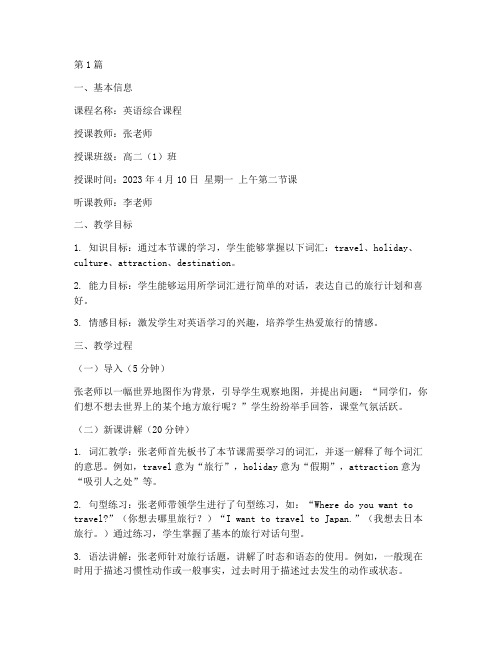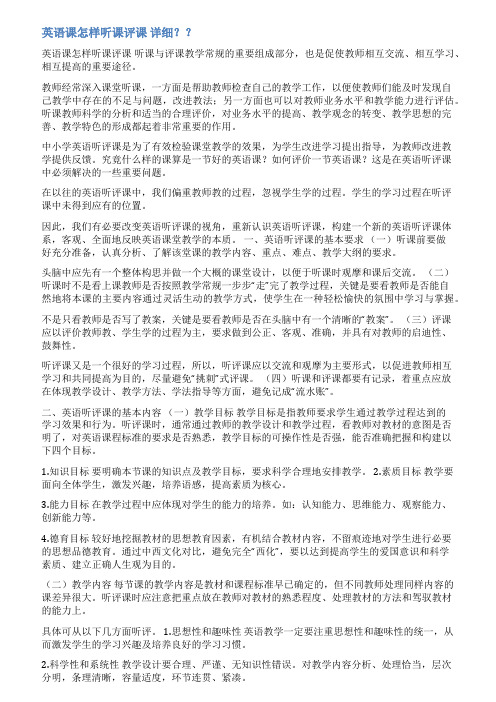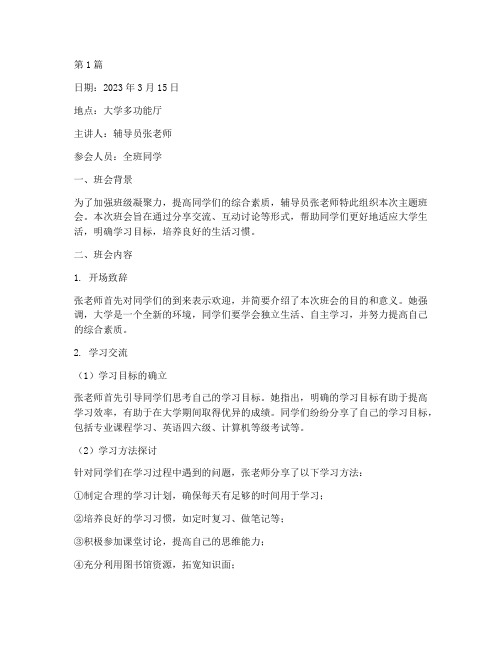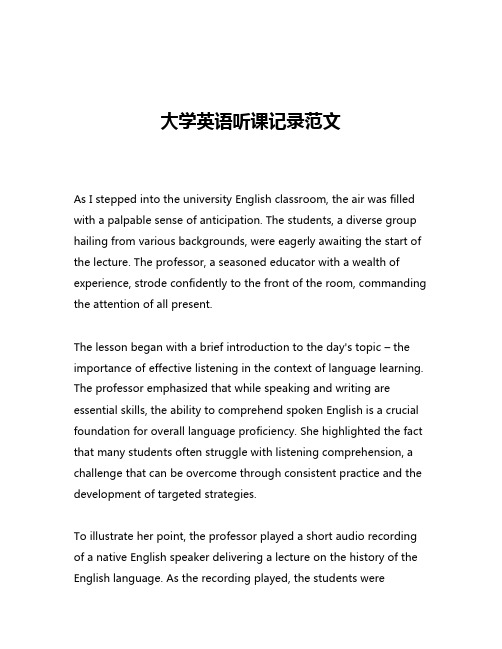大学英语听课记录
英语专业实习听课记录15(2)

听课记录及评价1Unit1 Makinga differe nceStep I Warming upTask 1 (class work) words present ationon the blackbo ardgenius,inspira tion, perspir ation,quote, mind, curious, be on fire for, be similar to, fearTask 2 (group work) competi tionT: Who made great contrib u tions to society and science? What great scienti sts do you know? And what are they famousf or?Ss: Maria Curie radiumand poloniu mZhang Heng seismog raph.Charles DarwinThe Theoryof Evoluti onThomasAlva Edisonthe light bulb.AlbertEinstei n The Theoryof Relativ i tyTask 3 (group work) Learnin g quotesT: Who are they on the screen?Ss: Albert Einstei n, Maria Curie, ThomasAlva EdisonT: Whom do you think these quotesare from? Do you know what they mean?S:I think it is from Edison. It means that if we make great efforts to do sth, we’ll succeed. And no matterh ow cleverh e is, a personwill fail if he doesn’t try his best. In Chinese, it means 天才就是百分之九十九的汗水加上百分之一的灵感。
辅导员 堂听课 记录表

这堂英语课的讲课知识点清晰,所选练习讲解较精当,课堂用语基本用英语,培养学生的口语表达能力。晏红老师首先给同学们播放新视野听力材料,评讲四级卷子,接着带领大家学习星火词网的新单词,并细心分析单词以及例句的难点与重点讲解。最后,进行上一节课布置单词的听写练习。
课后反馈(学生的课堂评价,辅导员听课感受)
听课记录表
课程名称
大学英语3
听课时间
10:30--12:00
教师姓名
Байду номын сангаас晏红
教师单位
重庆师范大学涉外商贸学院
授课对象
人力资源管理2班
授课地点
8407
学生
听课情况
学生出勤
情况
全勤
课堂纪律
学生上课的精神及注意力集中,课堂纪律良好
课堂气氛
上课学生们都认真听讲,回答老师问题的积极性也大
其他
教态端正,讲课投入,言行文明,师生关系融洽
晏红老师在课堂教学中表现出了扎实的教学基本功和丰富的教学经验,并展示出了教师关爱学生、循循善诱等方面的教学特点。课前准备充分,充分利用了多媒体教学,为学生创造了良好的语言学习情境,激发了学生的学习热情,调动了学生积极性。特别是在知识的引入过程中,十分注重启发学生思维,并在这一过程中努力提高学生的想象力和已有语言知识的运用能力。
听课人签名:
年月日
教学实践听课记录英语(3篇)

第1篇一、基本信息课程名称:英语综合课程授课教师:张老师授课班级:高二(1)班授课时间:2023年4月10日星期一上午第二节课听课教师:李老师二、教学目标1. 知识目标:通过本节课的学习,学生能够掌握以下词汇:travel、holiday、culture、attraction、destination。
2. 能力目标:学生能够运用所学词汇进行简单的对话,表达自己的旅行计划和喜好。
3. 情感目标:激发学生对英语学习的兴趣,培养学生热爱旅行的情感。
三、教学过程(一)导入(5分钟)张老师以一幅世界地图作为背景,引导学生观察地图,并提出问题:“同学们,你们想不想去世界上的某个地方旅行呢?”学生纷纷举手回答,课堂气氛活跃。
(二)新课讲解(20分钟)1. 词汇教学:张老师首先板书了本节课需要学习的词汇,并逐一解释了每个词汇的意思。
例如,travel意为“旅行”,holiday意为“假期”,attraction意为“吸引人之处”等。
2. 句型练习:张老师带领学生进行了句型练习,如:“Where do you want to travel?”(你想去哪里旅行?)“I want to travel to Japan.”(我想去日本旅行。
)通过练习,学生掌握了基本的旅行对话句型。
3. 语法讲解:张老师针对旅行话题,讲解了时态和语态的使用。
例如,一般现在时用于描述习惯性动作或一般事实,过去时用于描述过去发生的动作或状态。
(三)课堂活动(15分钟)1. 小组讨论:张老师将学生分成四人一组,要求他们讨论自己假期的旅行计划,并用英语表达出来。
2. 角色扮演:学生分成两组,一组扮演旅行者,另一组扮演导游。
旅行者向导游询问旅行路线、景点等信息,导游用英语回答。
(四)总结与作业布置(5分钟)张老师对本节课的内容进行了总结,并布置了以下作业:1. 请用英语写一篇关于自己假期的旅行计划的短文。
2. 收集五个关于旅行的英语短句,并翻译成中文。
大学英语课程教学听课记录范文

英语课怎样听课评课详细??英语课怎样听课评课听课与评课教学常规的重要组成部分,也是促使教师相互交流、相互学习、相互提高的重要途径。
教师经常深入课堂听课,一方面是帮助教师检查自己的教学工作,以便使教师们能及时发现自己教学中存在的不足与问题,改进教法;另一方面也可以对教师业务水平和教学能力进行评估。
听课教师科学的分析和适当的合理评价,对业务水平的提高、教学观念的转变、教学思想的完善、教学特色的形成都起着非常重要的作用。
中小学英语听评课是为了有效检验课堂教学的效果,为学生改进学习提出指导,为教师改进教学提供反馈。
究竟什么样的课算是一节好的英语课?如何评价一节英语课?这是在英语听评课中必须解决的一些重要问题。
在以往的英语听评课中,我们偏重教师教的过程,忽视学生学的过程。
学生的学习过程在听评课中未得到应有的位置。
因此,我们有必要改变英语听评课的视角,重新认识英语听评课,构建一个新的英语听评课体系,客观、全面地反映英语课堂教学的本质。
一、英语听评课的基本要求(一)听课前要做好充分准备,认真分析、了解该堂课的教学内容、重点、难点、教学大纲的要求。
头脑中应先有一个整体构思并做一个大概的课堂设计,以便于听课时观摩和课后交流。
(二)听课时不是看上课教师是否按照教学常规一步步“走”完了教学过程,关键是要看教师是否能自然地将本课的主要内容通过灵活生动的教学方式,使学生在一种轻松愉快的氛围中学习与掌握。
不是只看教师是否写了教案,关键是要看教师是否在头脑中有一个清晰的“教案”。
(三)评课应以评价教师教、学生学的过程为主,要求做到公正、客观、准确,并具有对教师的启迪性、鼓舞性。
听评课又是一个很好的学习过程,所以,听评课应以交流和观摩为主要形式,以促进教师相互学习和共同提高为目的,尽量避免“挑刺”式评课。
(四)听课和评课都要有记录,着重点应放在体现教学设计、教学方法、学法指导等方面,避免记成“流水账”。
二、英语听评课的基本内容(一)教学目标教学目标是指教师要求学生通过教学过程达到的学习效果和行为。
大学主题班会听课记录(3篇)

第1篇日期:2023年3月15日地点:大学多功能厅主讲人:辅导员张老师参会人员:全班同学一、班会背景为了加强班级凝聚力,提高同学们的综合素质,辅导员张老师特此组织本次主题班会。
本次班会旨在通过分享交流、互动讨论等形式,帮助同学们更好地适应大学生活,明确学习目标,培养良好的生活习惯。
二、班会内容1. 开场致辞张老师首先对同学们的到来表示欢迎,并简要介绍了本次班会的目的和意义。
她强调,大学是一个全新的环境,同学们要学会独立生活、自主学习,并努力提高自己的综合素质。
2. 学习交流(1)学习目标的确立张老师首先引导同学们思考自己的学习目标。
她指出,明确的学习目标有助于提高学习效率,有助于在大学期间取得优异的成绩。
同学们纷纷分享了自己的学习目标,包括专业课程学习、英语四六级、计算机等级考试等。
(2)学习方法探讨针对同学们在学习过程中遇到的问题,张老师分享了以下学习方法:①制定合理的学习计划,确保每天有足够的时间用于学习;②培养良好的学习习惯,如定时复习、做笔记等;③积极参加课堂讨论,提高自己的思维能力;④充分利用图书馆资源,拓宽知识面;⑤寻求同学、老师的帮助,共同进步。
3. 生活习惯养成(1)时间管理张老师强调,时间管理对于大学生来说至关重要。
她建议同学们制定时间表,合理安排学习、休息、娱乐等时间,避免拖延症。
(2)饮食健康张老师提醒同学们要注意饮食健康,合理搭配膳食,保证营养均衡。
同时,要养成良好的作息习惯,避免熬夜。
(3)锻炼身体张老师鼓励同学们积极参加体育锻炼,提高身体素质。
她建议同学们根据自己的兴趣选择合适的运动项目,如跑步、篮球、瑜伽等。
4. 互动环节(1)心理健康针对同学们在心理方面可能遇到的问题,张老师分享了以下建议:①保持乐观的心态,学会调整情绪;②学会倾诉,寻求心理支持;③积极参加社团活动,拓展人际关系;④寻求专业心理咨询。
(2)职业规划张老师提醒同学们要尽早规划自己的职业道路,明确职业目标。
大学听课记录评议意见

篇一:《听课记录评语》听课记录评语听课记录评语3月7日顾惠芳的《一面》,通过课前学生的讲述新闻,不但能培养学生的能力,还能培养所有学生参与分类,评价,鉴别能力。
对重点词、句作了必要分析,为学生语文素质打下了坚实基矗学生参与面广,但似乎缺少点激-情。
3月2日缪瑞芳的〈〈二元一次方程组的解法〉〉,能把握学生的认知规律,通过复习旧知导入新知,注意解题的示范作用,课堂容量足,条理清晰。
但课堂少活泼,很多可由学生解决的由教师替代了,拖堂也较长。
3月5日钱爱萍的〈〈人类最宝贵的是生命〉〉,学生对知识的掌握较好,从中可看出热爱上了这门功课,大多同学能围绕教师的提问动脑思考。
授课形式多样,通过讲授、讨论、朗读等方式,达到了示范课的目的。
3月10日严中英的〈〈中国结〉〉,教师能在组织旧知识的基础上讲新课,且从旧知到新知的过渡自然,学生积极性也高。
教师能很有耐心地进行个别指导,很有亲和力。
但示范效果不好,其实在这里分组学习会更好。
季艳芳老师的语文课给我的感受是备课充分、讲解精辟、重点突出、善于调动学生积极性。
房平老师的英语课思路清晰、语言流畅、安排合理、效果良好。
林燕、陈红梅老师的课有一定改进,但仍需努力,要加强教师基本功训练,虚心学习,不断提高,力争成为学校骨干教师。
刘梦麟3月1日听了林燕老师的《dream homes》,认为林燕老师的教学组织能力有了很大进步,知识点讲解清晰,所选练习讲解较精当,教学中各环节能有效衍接,课堂容量较足。
但根据初一学生状况,课堂教学中学生口语练习还可增加,知识点的讲解、巩固如能使用多媒体设备来辅助教学效益会更高。
3月6日听了邵宏誓老师的《美好人生我选择》——直面升学与择业,认为本节课学习内容是与学生生活、学习紧密结合、息息相关的课题,教师授课中有针对性地探讨了学生面临的问题及相应对策,教学中能密切结合校园内及学生身边熟悉的事件开展教学,深入浅出,启发学生进行思考,开展讨论。
教师语言表述清晰、精要、幽默。
大学英语听课记录范文

大学英语听课记录范文As I stepped into the university English classroom, the air was filled with a palpable sense of anticipation. The students, a diverse group hailing from various backgrounds, were eagerly awaiting the start of the lecture. The professor, a seasoned educator with a wealth of experience, strode confidently to the front of the room, commanding the attention of all present.The lesson began with a brief introduction to the day's topic – the importance of effective listening in the context of language learning. The professor emphasized that while speaking and writing are essential skills, the ability to comprehend spoken English is a crucial foundation for overall language proficiency. She highlighted the fact that many students often struggle with listening comprehension, a challenge that can be overcome through consistent practice and the development of targeted strategies.To illustrate her point, the professor played a short audio recording of a native English speaker delivering a lecture on the history of the English language. As the recording played, the students wereinstructed to take notes and focus on key details, such as the main ideas, supporting evidence, and any unfamiliar vocabulary. The atmosphere in the room was one of intense concentration, with the only sound being the gentle scratch of pens against paper.Once the recording had finished, the professor invited the students to share their observations and insights. A lively discussion ensued, with students raising their hands and offering their perspectives on the content of the lecture. The professor skillfully guided the conversation, asking probing questions and encouraging the students to elaborate on their thoughts. She was particularly impressed by the level of detail and nuance in the students' responses, indicating that they had indeed been actively engaged in the listening exercise.To further reinforce the importance of listening comprehension, the professor then divided the class into small groups and assigned them a task. Each group was given a different audio recording, ranging from a news broadcast to a TED talk, and were instructed to work together to identify the main ideas, key supporting points, and any challenging vocabulary. The students eagerly set to work, collaborating with their peers and actively discussing the content of the recordings.As the class progressed, the professor continued to introduce variouslistening strategies and techniques, such as predicting content, identifying key words and phrases, and using context clues to decipher unfamiliar terms. She encouraged the students to experiment with these strategies and to share their experiences with the rest of the class. The students were receptive to the professor's guidance, asking insightful questions and offering thoughtful reflections on the effectiveness of the different approaches.One particularly memorable moment occurred when the professor played a recording of a heated political debate. The students were tasked with identifying the main arguments presented by each side, as well as any instances of logical fallacies or rhetorical devices. The discussion that followed was both lively and thought-provoking, with the students demonstrating a nuanced understanding of the complexities of the topic.Throughout the class, the professor maintained a warm and engaging demeanor, fostering an environment of mutual respect and intellectual curiosity. She recognized the diverse backgrounds and learning styles of her students, and tailored her teaching methods accordingly. Whether it was through interactive group activities, individual reflections, or whole-class discussions, the professor ensured that each student had the opportunity to actively participate and contribute to the learning process.As the class drew to a close, the professor emphasized the importance of continued practice and self-reflection in the pursuit of effective listening comprehension. She encouraged the students to seek out opportunities to listen to authentic English content, such as podcasts, news broadcasts, and TED talks, and to regularly assess their progress and identify areas for improvement.The students left the classroom with a renewed sense of purpose and a deeper appreciation for the power of active listening. They recognized that mastering this skill would not only enhance their language proficiency but also open up a world of opportunities for personal and professional growth. The lessons learned in this English listening class would undoubtedly serve them well in their academic and future endeavors.。
英语听课记录(完整版)

听课记录听课对象:七(四)班英语黄老师Unit5:Why do you like koalas?Section A: 1a—1c 主要内容:Step1:Greetin gsStep2:Teachin g aims1.learn animals2.Descrip t ions: cute,fun,interest ing,smart,lazy,beautif u l,scary3.tell the reasonStep3:Lead inLet the student s say out the picture s:cat,dog,koala,panda,elephan t, giraffe,lion,tigerStep4:Play a gameGo to the zoo to get close to the animals.Can you guess? What are they? Y ou can ask like this.For example:----Is it a dog?-----No,it isn’t.-----Is it a giraffe?-----Y es,it is.Step5:Pairwork(practic e the dialogu e with the picture s on the blackboard)--What animals do you like?-- I like pandas.-- Why do you like pandas?-- Because they are cute. How about you?-- I like pandas, too.-- Oh ,let’sseethepandasfirst!-- That soundsgood!-- OK.Let’sgo!Step6:Do 1a(Match and read the dialogu e)Step7:Listen1bStep8:Read 1cStep9:Do the exercis eStep10:Make a conclus ion.(Just as the teachin g aims)1.Animals2.Descrip t ions:cute fun interesting smart lazy beautif ul scary(a little=k ind of very)3. Make a dialogu e4. 重点语法:▲why----because▲let + V原形▲kind of= a little有点儿▲a kind of 一种▲kinds of 多种多样的Step11:Learn more meaning from this lessonfrom a piture. (Animals are our friends.W e shouldtreat them well.---“Love animals ,Love ourselv es!”)Step12:HomeworkRecitethe words in this unit and do the exercis e book in period 1.重点与难点:1.重点:The words of animals and descrip t ions (cute,fun,interesting,smart,lazy,beautif ul,scary)2.难点:Pairwork(practic e the dialogu e with the picture s on the blackboard评:这堂课的教学中黄老师用的教法有:1.使用多媒体;2.制作有关动物的卡片;3.用Pairwo rk的方法来练习对话,从而进一步的掌握动物和描述动物的形容词;4.练习题紧跟,及时巩固本节所学知识点。
- 1、下载文档前请自行甄别文档内容的完整性,平台不提供额外的编辑、内容补充、找答案等附加服务。
- 2、"仅部分预览"的文档,不可在线预览部分如存在完整性等问题,可反馈申请退款(可完整预览的文档不适用该条件!)。
- 3、如文档侵犯您的权益,请联系客服反馈,我们会尽快为您处理(人工客服工作时间:9:00-18:30)。
课堂设计Section A (3 periods): A Test of True Love1st---2nd periods: Pre-reading activities ( theme-related questions for warming up;)While-reading activities (cultural notes; useful words and expressions;difficult sentences)3rd period: While-reading activities (text structure; main ideas)Post-reading activities (comprehension questions; exercises)具体内容1. Pre-reading Activities1) Check the homeworkTopics1. What do you think very important in someone whom you will love? (For example, do you care very much about his/her appearance?)2. Have you ever seen a movie or read a novel about love that moved you deeply?3. What kind of love do you expect in your life?2. While-reading Activities1) Use questions as a means of clarifying the organization of this passage.Check the Ss’ understanding of the text with following questions1. Why was John Blandford staying in Grand Central Station in New York?He was waiting to see a woman who had filled a special place in his life for the past thirteen months.2. How did John get connected to the woman?3. How was John’s first response to the woman different from that of his friends?4. What had the woman, Hollis Meynell, done in the past thirteen months?She had faithfully written to John. Even when his letters did not arrive, she wrote anyway, without decrease.5. How did he feel as long as he received her letters?6. When he asked her for a photo, what did she do?7. Did Hollis Meynell come to the station as they had arranged?Yes, but she had asked a lady well over forty to wear the rose on her coat.8. Why did Hollis Meynell want to test John Blandford?2) Language Points:1. without fail: (Line 6)①when you tell sb to do sth without fail, you are telling them that theymust do it; with complete certainty 务必,一定②always 总是,必定I want you here by two o’clock without fail. 我要你两点钟务必来到这里。
He writes every week without fail. 他每周必定写信。
2. Soon after he volunteered for military service, he had received a book from this woman. (Para.2)Meaning: Not long after he joined the military, he had received a book from this woman. volunteer: offer to do sth without being forced to do it or without getting paid for it 自愿做,义务做,无偿做volunteer (sth) (for/as sth)John volunteered to organize a petition. 约翰自告奋勇组织请愿/上访。
He volunteered his services as a driver. 他自愿服务充当司机。
Several staff members volunteered for early retirement. 几位职员自愿提前退休。
volunteer (for sth): join the army, etc. without being forced to 自愿参军,当志愿兵volunteer for military service / for the navy 自愿服兵役; 自愿参加海军volunteer: (n) a person who does a job without being paid for it 义务工作者,志愿者; a person who offers to do sth without being forced to do it 自告奋勇者,主动做某事的人3. And while they all got strength from it, and appreciated her support of their cause, John Blandford was the only person to write Ms. Meynell back. (Para. 2)while: (used at the beginning of a sentence) although; in spite of the fact that… (用于句首)虽然,尽管While I am willing to help, I do not have much time available.尽管我愿意帮忙,但是没有多少时间。
While (he is) respected, he is not liked. 他虽受人尊敬,却不受人喜爱。
write (sb) back; write back (to sb): write sb a letter replying to their letter(给某人)写回信,复信I’m afraid I never wrote back. 我恐怕从未写过回信。
She wrote back saying that she couldn’t come. 她回信说她来不了。
I wrote back accepting their offer. 我回信表示接受他们的提议。
4. overseas: (Line 13) (ad) in or to a country across the sea; abroad 在国外,在海外The product is sold both at home and overseas. 这个产品行销国内外。
This is Obama’s first visit overseas since taking office. 这是奥巴马就职后的首次海外之行。
live/work/go overseas 在国外生活/工作;出国overseas : (adj) coming from or happening abroad 外国的,海外的overseas markets/trade 海外市场,海外贸易overseas students/visitors 海外/外国留学生,海外/外国游客5. During the difficult days of war, her letters nourished him and give him courage. (Para. 3) Meaning: During the difficult days of war, her letters gave him strength and courage.Here, the verb “nourish” is used metaphorically, meaning “maintain, encourage, strengthen sth”. Nourish: allow a feeling, an idea, etc. to develop or grow stronger 培养,助长(情绪、观点等)By investing in education, we nourish the talents of our children.我们通过教育投资,培养孩子们的才能。
Letters of love only nourished her longing for him. 情书只是增加了她对他的思念。
University study nourished his ability to think critically. 大学学习培养了他的批判性思维能力。
6. But when he asked her for a photo, she declined his request. (Para. 4)Meaning: But when he asked her for a photo, she refused politely.decline:①refuse a request or offer, usually politely 谢绝,婉言拒绝I offered to give them a lift but they declined. 我主动邀请他们搭车,但他们婉言谢绝了。
